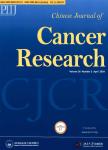SURGICAL TREATMENT OF PRIMARY ESOPHAGEALADENOCARCINOMA
SURGICAL TREATMENT OF PRIMARY ESOPHAGEALADENOCARCINOMA作者机构:Department of Thoracic Surgery Cancer Institute & Hospital Chinese Academy of Medical Sciences Peking Union Medical College Beijing China
出 版 物:《Chinese Journal of Cancer Research》 (中国癌症研究(英文版))
年 卷 期:1999年第11卷第1期
页 面:44-48页
核心收录:
学科分类:1002[医学-临床医学] 100214[医学-肿瘤学] 10[医学]
主 题:Esophageal neoplasm Adenocarcinoma surgery Carcinoma squamous cell Combined therapy Prognosis
摘 要:Objective: To study the biocharacteristics of primary esophageal adenocarcinoma (PEAC) and factors influencing patients’ prognosis and to find rational surgical indications and combined therapy. Methods: To analyze the clinical material of 106 patients with PEAC and compared with that of patients with esophageal squamous-cell carcinoma (ESCC). Results: The overall resectability, morbidity and 30-day mortality rates of PEAC were 92.5%, 23.5% and 2.8% respectively, similar to those of ESCC. The TNM staging, lymph node metastasis, extraesophageal invasion and the nature of operation were major determinants influencing long-term prognosis. The 5-year survival rate of PEAC was 21.0%, which was lower than that of ESCC (P0.01). Metastasis or recurrence remained to be the cause of death in 82.4% of patients who lived longer than 5 years, which was higher than that of ESCC (P0.01). Adjuvant radiation did not influence survival of the patients with lymph node metastasis, but appeared helpful to the patients with no lymph node metastasis. Conclusion: compared with ESCC, PEAC is a malignant disease with poor prognosis. Surgical resection is the first and chief choice of treatment. Surgical indications include patients in stage 0, I, II and some in stage III and even in stage IV of PEAC. Early detection, early diagnosis and early treatment as well as radical operation could improve prognosis. Adjuvant radiotherapy appears helpful only to the patients without lymph node metastasis.



